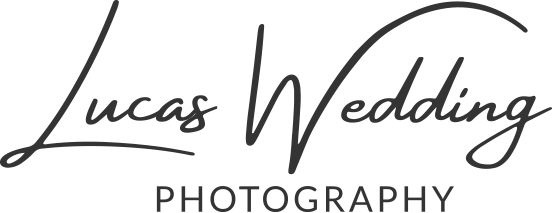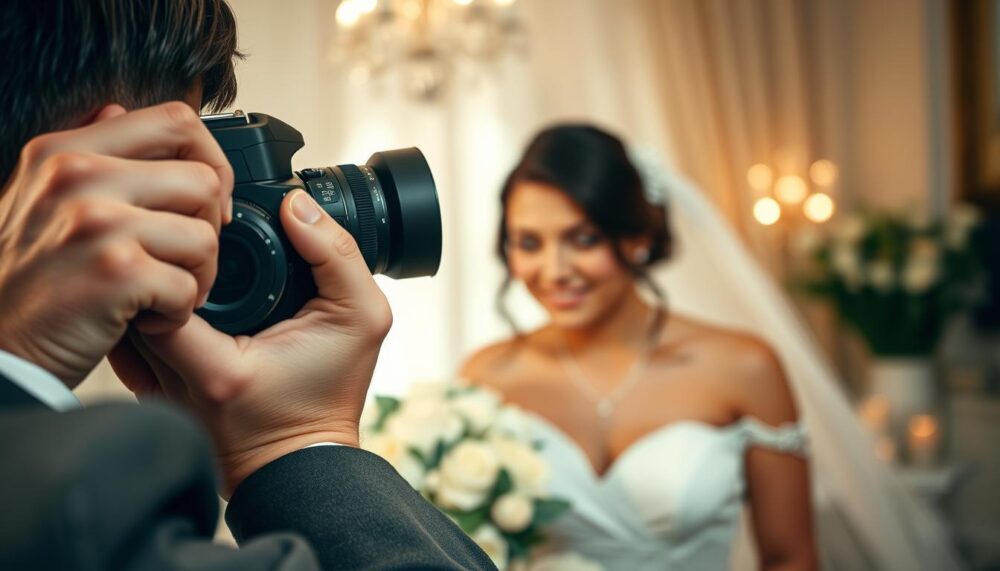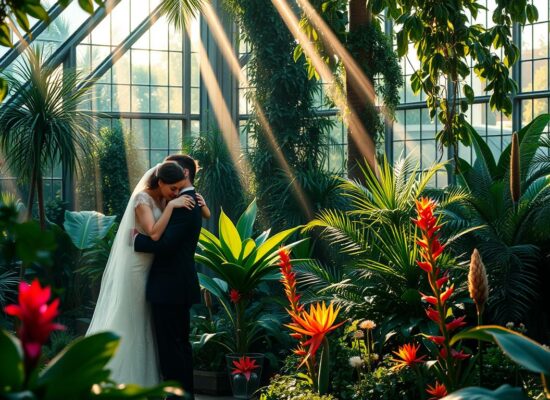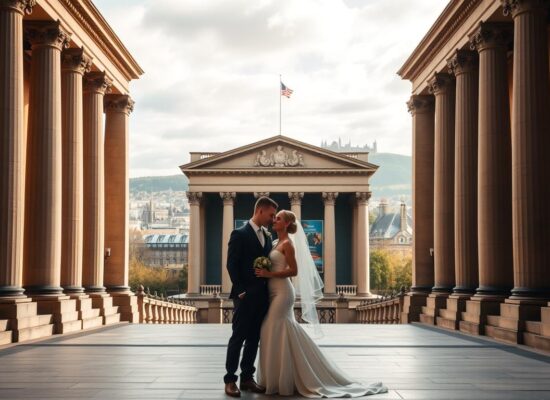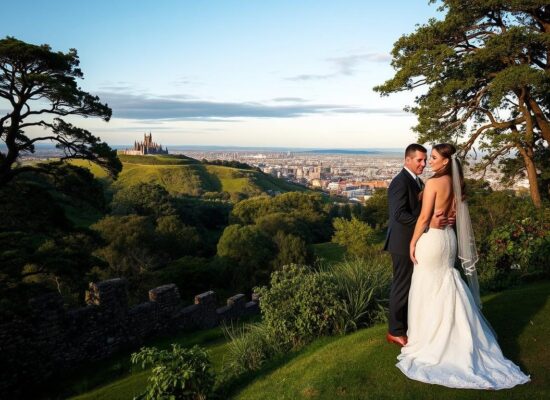Your wedding day is one of life’s most cherished moments. Capturing those memories requires a skilled professional who understands your vision. With so many options, selecting the right wedding photographer can feel overwhelming.
In the UK, styles and pricing vary across regions. The average cost ranges between £1,500 and £1,700, but style compatibility matters more than location. Many photographers travel nationwide to document special days.
Let’s break it down with seven practical tips. From researching portfolios to assessing personalities, these steps simplify the process. A great photographer blends technical expertise with an ability to make couples feel at ease.
Key Takeaways
- Photography preserves priceless memories from your special day
- Prioritise style and personality over location constraints
- UK prices typically range from £1,500 to £1,700
- Review portfolios to ensure artistic alignment
- Schedule consultations to gauge rapport
Introduction
Decades from now, your photographs will tell the story when details fade. While confetti sweeps away and champagne flutes gather dust, these images become your tangible memories. Yet selecting the right creative to capture them? That’s where 72% of couples feel the pinch, according to UK surveys.
A surprising 38% later regret their choice, often due to mismatched styles or rushed decisions. The debate between documentary (candid storytelling) and traditional (posed elegance) rages on. Take Birmingham’s photographer scene – many now favour relaxed group shots over stiff line-ups.
Key factors to weigh:
- Consistency: Does their portfolio shine in both sunny and soggy conditions?
- Rapport: You’ll spend 8–12 hours together on the day – comfort matters.
- Contracts: Clear terms on deliverables prevent post-celebration headaches.
“Our North Wales photos felt authentic, not staged – like reliving the joy all over again,” shares recent bride Elin.
Pro tip: Peak-season dates book 12–18 months ahead. But breathe easy – we’ll navigate this maze together.
Understanding Wedding Photography Styles
The artistry behind your wedding photos begins with choosing the right style. Each approach tells your story differently—whether through spontaneous moments or carefully crafted portraits. In the UK, 68% of couples now blend styles for a personalised album.
Documentary/Reportage Photography
This reportage style captures 80% candid shots, perfect for couples who want raw emotion. Think unposed laughter during speeches or stolen glances. Birmingham’s Chris Jones champions this with his “be more you” philosophy.
Creative Wedding Photography
For bold couples, creative styles incorporate props like smoke bombs or dramatic lighting. Ideal for urban venues or warehouses, it’s about pushing boundaries while keeping authenticity.
Fine Art Wedding Photography
Luxurious and timeless, this style dedicates 2–3 hours to couple portraits. Often shot with medium-format cameras (used by 45% of professionals), it suits stately homes or scenic landscapes.
Traditional Wedding Photography
Classic posed group shots remain popular, especially for formal venues. Though 15% cheaper on average, ensure your photographer avoids stiff compositions.
| Style | Time Investment | Lighting | Best For |
|---|---|---|---|
| Documentary | 30 mins (couples) | Natural | Relaxed weddings |
| Fine Art | 2–3 hours | Studio/natural mix | Detailed portraits |
“Our Liverpool wedding mixed documentary and fine art—natural joy with gallery-worthy shots,” says recent bride Aisha.
Pro tip: Venue type heavily influences style. A castle demands different framing than a beach. Always review full galleries to avoid mismatched expectations.
How Do I Find a Good Wedding Photographer? Start with Research
Smart couples know that thorough research unlocks hidden talent. Before creating your shortlist, explore multiple channels to discover professionals who match your vision.
Using Wedding Blogs for Inspiration
UK blogs like Rock My Wedding showcase real couples’ galleries. These often include photographer credits and styling details.
Decode jargon like “editorial style” (posed but natural-looking) or “reportage” (pure candid). Instagram geotags at your venue reveal how different creatives work with the space.
Seeking Personal Recommendations
Friends’ experiences provide honest insights. Verify online reviews by checking:
- Multiple platform ratings
- Detailed written feedback
- Response patterns to criticism
Attending Wedding Fairs
Events like Birmingham’s Eclectic Wedding Extravaganza let you meet 50+ specialists face-to-face. Compare boutique and mass-market fairs:
| Fair Type | Photographers | Best For | Discounts |
|---|---|---|---|
| Boutique | 15-20 curated | Alternative styles | 10-15% |
| Mass-market | 50+ varied | Price comparisons | 5-10% |
“At Manchester’s Un-Wedding Show, we found our photographer offering a fair-exclusive package,” shares recent groom Liam.
For UK-specific searches, the Guild of Photographers directory verifies professionals’ credentials and insurance status.
Creating Your Shortlist
The real test of a photographer’s skill lies beyond their portfolio highlights. When reviewing candidates, demand access to complete wedding galleries – typically 400-800 delivered images for full-day coverage. This reveals their true capabilities across all moments, not just curated hero shots.
Evaluating Full Wedding Galleries
Professional photographers in the UK showcase their best work online, but unedited examples tell the full story. Look for these key indicators:
- Detail retention: Lace patterns on dresses should remain crisp, not blurred
- Skin tones: Natural-looking across different lighting conditions
- Editing balance: Avoid colour casts or lost highlights in bright areas
Birmingham-based photographers like The Harris Collective offer password-protected galleries showing three complete weddings. This transparency helps couples assess consistency in their work.
Checking Consistency in Different Conditions
Great photos shouldn’t depend on perfect weather. Compare images from:
| Condition | Technical Challenges | What to Look For |
|---|---|---|
| Summer midday | Harsh shadows | Even exposure without blown highlights |
| Winter twilight | Low light | Clean images with minimal noise |
| Rainy ceremonies | Mixed lighting | Accurate white balance |
Red flags include missing ceremony shots or repetitive angles. Verify 92% of professionals use dual card slots and cloud backup – ask for their data protection policy.
“We requested EXIF data to check low-light performance and were impressed by how our photographer handled Manchester’s gloomy November light,” shares recent bride Priya.
Remember, 70% of budget options outsource editing abroad. Always confirm who handles your images and their quality control process.
Setting Your Budget
Navigating wedding photography costs requires savvy planning and clear priorities. In the UK, packages range from £1,200 (6 hours) to £2,500 (12 hours with an album). Regional differences matter—London averages 15% higher than Yorkshire.
Peak season (May–September) often carries a 20% premium. Opting for Fridays or Sundays can save £300–£500. Always ask about:
- Travel fees for remote venues
- Overtime charges (typically £150–£200/hour)
- Album costs (£300–£600 extra)
“We secured a 10% discount by booking our Birmingham photographer in January,” shares groom-to-be Raj. Over half of professionals offer payment plans—ideal for spreading costs.
Compare à la carte and all-inclusive options. VAT-registered businesses add 20%, so confirm quotes include tax. Avoid deposits exceeding 30%; reputable photographers cap at 25%.
Pro tip: Use the MoneySavingExpert budget calculator to allocate funds wisely. Wedding insurance often covers photographer cancellations—check policies for equipment coverage too.
Meeting or Interviewing Photographers
The chemistry between you and your photographer shapes your entire experience. Over three-quarters of couples prioritise personality over technical prowess, according to UK surveys. This day demands trust—you’ll spend more time with them than your maid of honour.
Questions to Ask Your Potential Photographer
Prepare a mix of logistical and creative queries. A photographer’s answers reveal their professionalism and adaptability. Essential topics include:
- Backup plans: Do they carry spare equipment and have insurance?
- Response time: How quickly do they reply to emails or phone calls?
- Cultural considerations: Can they accommodate traditions or unplanned moments?
“We asked about rainy-day alternatives and loved their creative indoor shot ideas,” shares Birmingham bride Hannah.
Assessing Personality Fit
Try the “three laugh test”—if you naturally chuckle three times during the consultation, rapport is strong. Watch for red flags like vague equipment descriptions or rushed answers.
Most UK consultations last 45–90 minutes. Use this time to discuss:
- Contingencies for delays or venue issues
- Their approach to directing shy couples
- Preferred communication style post-booking
Pro tip: Schedule Zoom calls with your top three choices. Test their tech setup—glitchy audio hints at poor preparation.
Checking Credentials and Policies
Behind every stunning wedding album lies crucial paperwork and protections. While beautiful images capture attention, proper insurance and watertight contracts safeguard your investment. Nearly half of disputes arise from unclear terms, making this step essential.
Insurance and Backup Equipment
UK professionals should carry £2 million public liability coverage minimum. This protects against accidents like equipment damage to venues. Always ask for proof of:
- Equipment redundancy: Dual camera bodies and multiple lenses
- Professional indemnity for editing errors
- Data loss protection for digital files
A Manchester couple learned the hard way when their uninsured photographer‘s stolen camera meant no reception photos. Reputable providers use cloud backups alongside physical storage.
Understanding Contracts
Clear agreements prevent 43% of common disputes. Compare these UK standards:
| Essential Clause | Nice-to-Have | Red Flag |
|---|---|---|
| Delivery timeframe (6-8 weeks typical) | Pre-wedding consultation | “Unlimited edits” promises |
| Force majeure provisions | Second shooter included | Vague deliverables list |
GDPR compliance matters for image usage rights. Ensure contracts specify whether you’ll appear on their marketing materials. Non-refundable deposits over 25% warrant scrutiny—reputable firms cap at this rate.
“Our contract included a shot list template that made planning effortless,” shares Yorkshire bride Sophie. “Knowing exactly what we’d receive eliminated stress.”
Pro tip: The UK Photographers’ Union offers free contract checklists to verify your agreement covers all bases before signing.
Common Mistakes to Avoid
Many couples stumble into predictable traps when choosing their photography team. These oversights often lead to mismatched expectations or missed opportunities. Awareness of these pitfalls ensures your selection process stays on track.
Overemphasising Venue Experience
Contrary to popular belief, 68% of top photographers prefer new venues for creative inspiration. While local knowledge helps, adaptability matters more. London-based shooter Mia Carter notes: “Fresh locations spark my best work—I approach them without preconceptions.”
Prepare a venue information pack with:
- Floor plans with ceremony sightlines
- Parking/loading access details
- Three backup indoor shooting areas
Focusing Only on “Hero Images”
Portfolios often showcase model shoots rather than real weddings. Spot the difference by checking:
- Consistent facial features across gallery images
- Natural interaction between subjects
- Diverse weather conditions shown
Request full rainy-day galleries—professionals worth their salt will share these proudly. Beware portfolios relying solely on golden-hour shots; they may struggle with midday harsh light.
“We nearly booked someone based on stunning sunset portraits, then realised all their cloudy-day shots looked flat,” admits Bristol bride Yasmin.
Modern editing tools create other red flags:
| Authentic Technique | AI Overuse Signs |
|---|---|
| Subtle skin retouching | Plastic-looking complexions |
| Natural shadow gradients | Over-sharpened edges |
Pro tip: Ask to see unedited RAW files alongside final images. This reveals their true skill in challenging conditions.
Understanding What You’re Paying For
Investing in quality photography means understanding every element of your package. From coverage hours to final prints, each detail impacts your experience and budget. Here’s how to decode what’s included—and what might cost extra.
Coverage Hours and Deliverables
Most UK photographers offer packages based on hours (6–12) and deliverables. A full-day coverage typically includes:
- 400–800 edited images (2–3 weeks’ editing time)
- High-resolution JPEGs (avoid TIFFs unless printing large albums)
- Online gallery access for 6–12 months
Ask about RAW file ownership—some retain copyright, while others release them for an added fee. According to average UK photography costs, editing alone can take 20–30 hours per wedding.
Prints and Albums
Not all prints are equal. Premium options use archival-grade paper, resisting fading for decades. Compare:
| Option | Lifespan | Cost (UK Avg) |
|---|---|---|
| Lab-grade | 100+ years | £300–£600 |
| DIY/home printers | 10–15 years | £50–£150 |
“Our photographer’s album took eight weeks but felt worth the wait—the quality surpassed high-street books,” notes Essex couple Gemma and Ryan.
Beware cheap suppliers using acidic paper. For digital files, cloud storage (like Dropbox) ensures backups, while USB drives risk corruption.
Finalising Your Choice
The last step in securing your perfect match involves strategic planning. UK couples who implement a 24-hour cooling-off period report 92% satisfaction rates—this breather helps avoid rushed commitments.
- Editing styles across different lighting conditions
- Response times during the enquiry phase
- Contract flexibility for date changes
Protect your deposit by ensuring it’s held in a client account. Reputable professionals often use escrow services—this safeguards both parties. When declining other candidates, a brief email maintains goodwill within the tight-knit industry.
Peak booking seasons demand quicker decisions. Summer dates typically secure 9 months ahead, while winter weddings allow more time. Once confirmed, share the news thoughtfully—tagging your photographer boosts their visibility without oversharing previews.
“Our venue walkthrough two months prior identified perfect golden-hour spots we’d missed,” notes Cornwall bride Eleanor.
Finalise with a checklist:
- Signed contract exchange
- Shot list submission deadline
- Final balance payment date
- Emergency contact swap
This way, you’ll transition smoothly from booking to celebrating—with every detail accounted for.
Pre-Wedding Preparations with Your Photographer
Strategic planning transforms random snaps into a cohesive visual story. Over three-quarters of professionals request final schedules four weeks ahead—this synchronises timings with venue logistics and optimal lighting. Golden hour shifts dramatically across UK seasons, from 5pm in winter to 9pm in summer.
Planning Key Shots
Prioritise must-have shots while allowing spontaneity. A balanced list typically includes:
- Ceremony moments (vows, ring exchange)
- Three generational family groupings
- Detail shots of attire and decor
For sensitive situations like divorced parents, discreet numbering systems prevent awkwardness. Brighton photographer Elena Rossi suggests: “Number groups on your list—we’ll discreetly call them without announcing relationships.”
Discussing Timings and Locations
UK locations often require permits—check council rules for beaches or parks. Optimise your timeline with:
- Buffer periods between events
- Sunrise/sunset calculators for golden hour
- Indoor backups for inclement weather
“Our Lake District sunrise portraits became our favourites—despite the 4am start!” shares groom Tom.
Finalise communication frequency—weekly check-ins work best for most couples. Share venue maps highlighting power outlets and loading zones to streamline the day.
Conclusion
Choosing the right creative to capture your day ensures memories last a lifetime. Focus on style compatibility, personality fit, and clear contracts—these elements matter most for couples investing in quality imagery.
Download our free checklist to simplify decisions. It covers key factors like portfolio reviews, budget planning, and contingency questions. Birmingham-based professionals often book 6–9 months ahead, so start early. If you’re not sure where to begin, our wedding photography checklist for couples outlines all the essentials.
Trust your instincts during consultations. The best photographer will make you feel at ease while showcasing technical skill. Remember, this process should feel exciting, not stressful.
For UK-specific resources, explore The Guild of Photographers’ directory. Your images become family heirlooms—choose someone who understands that legacy.
FAQ
What’s the best way to research potential photographers?
Start by browsing wedding blogs for inspiration, asking friends for personal recommendations, and attending wedding fairs to meet professionals in person. A mix of online and offline research helps narrow down your options.
How important is a photographer’s style?
Crucial! Whether you prefer documentary, fine art, or traditional photography, the style must match your vision. Review full wedding galleries to ensure consistency in lighting, composition, and storytelling.
Should I prioritise budget over quality?
Balance is key. While budget matters, investing in a skilled professional ensures stunning photos that last a lifetime. Compare packages to see what’s included—like prints or albums—before deciding.
What questions should I ask during interviews?
Discuss coverage hours, backup plans for equipment failures, and their approach to capturing key moments. Also, assess if their personality fits your day—you’ll spend a lot of time together!
Why is checking contracts essential?
Contracts clarify deliverables, cancellation policies, and copyright terms. Ensure they include insurance details and backup solutions—vital for avoiding last-minute stress.
How can I avoid common booking mistakes?
Don’t fixate solely on hero shots or a photographer’s familiarity with your venue. Focus on their ability to capture genuine moments and adapt to different lighting conditions.
What should I expect from pre-wedding preparations?
A great photographer will plan timings, scout locations, and discuss must-have portraits. This ensures smooth coordination on your wedding day.
